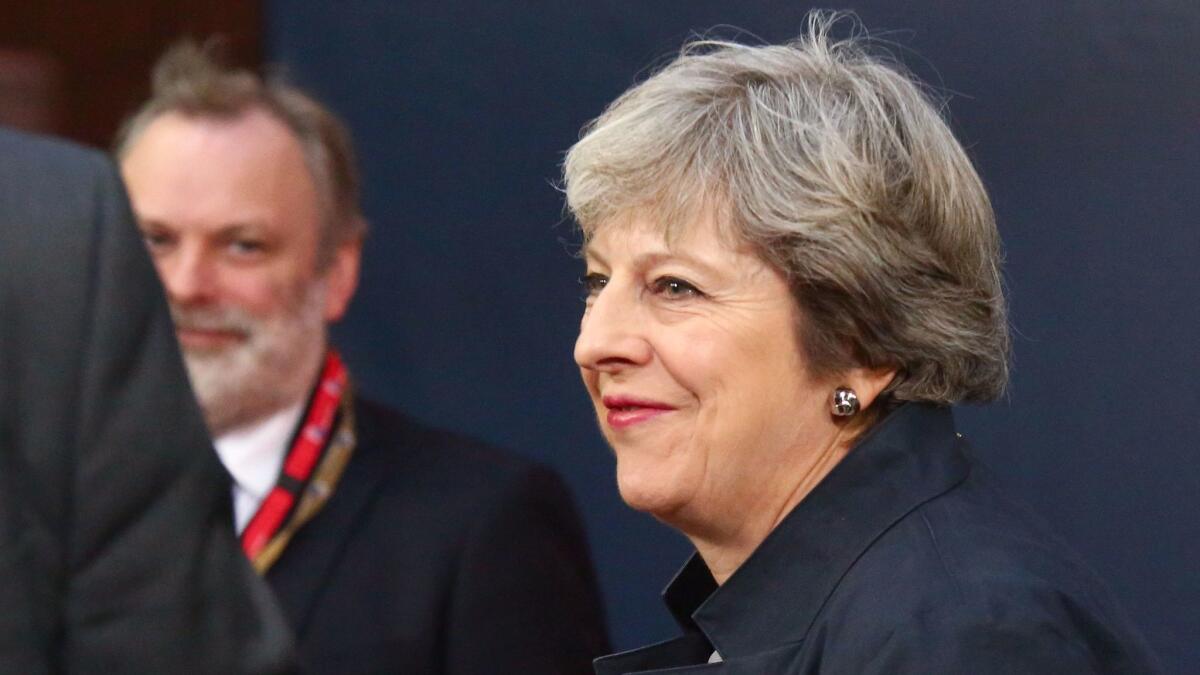Nailing down Britain’s exit payment sits front and center for the European Union

Reporting from Brussels — The European Union and Britain remain billions of dollars apart in what each side expects as the price tag for breaking away from the multi-nation bloc, stalling negotiations, officials said Friday.
British Prime Minister Theresa May did not specify how much Britain would pay when it leaves the bloc. She recently said Britain would pay its commitment in the current EU budget period, which runs up to 2020 and amounts to an estimated $24 billion.
But EU leaders at a two-day summit in Brussels said the estimated $24 billion was not enough.
French President Emmanuel Macron told a news conference that Britain would be expected to offer much more money before negotiations could move on to such topics as trade deals.
“Britain needs to make a substantial financial effort,” Macron said. “We are not halfway there yet.”
EU officials have estimated that Britain’s obligations to the bloc will be about $70 billion or more. The 27 countries that will remain in the EU do not want their costs to increase during the budget period.
British voters in a 2016 referendum favored leaving the EU and the country is expected to break from the bloc in March 2019.
When negotiators began talks this year, leaders from the EU countries said three key issues were the rights of citizens living in the EU and Britain, the border between Northern Ireland and the Republic of Ireland and the tens of billions of euros that Britain would owe the EU.
Some leaders lamented the slow pace of negotiations when they arrived Thursday for the summit.
But German Chancellor Angela Merkel said she was confident the negotiations would succeed.
“From my point of view, I don’t have any reason to believe that we’re not going to be successful. We’re working on it, we are working hard,” Merkel said Thursday evening.
Several leaders said that the financial issue is most pressing because Britain and EU negotiators are still far from an agreement.
British negotiators wanted to start discussions on a trade deal earlier this year, but were forced to wait when EU leaders demanded that those talks could start only after the first phase of negotiations.
In a speech in Florence, Italy, last month, May said the U.K. will pay its “fair share” of costs that it agreed to while it was still an EU member. She also vowed to safeguard the residency rights of citizens from other EU countries who live in the U.K.
EU leaders saw that as a promising development. They decided Friday to start preparing their own position for a trade agreement, although negotiations with Britain will not start yet.
European Council President Donald Tusk said the EU leaders’ decision to start those discussions “would not be possible without the new momentum given by the Florence speech of Prime Minister May.”
“I would like to reassure our British friends that in our internal work we will take account of proposals presented there,” Tusk said Friday in a statement.
In Florence, May said there should be a “creative” arrangement to maintain the U.K.’s trade ties to the EU, instead of a free trade agreement that could take years to negotiate.
Stupp is a special correspondent.
More to Read
Sign up for Essential California
The most important California stories and recommendations in your inbox every morning.
You may occasionally receive promotional content from the Los Angeles Times.










